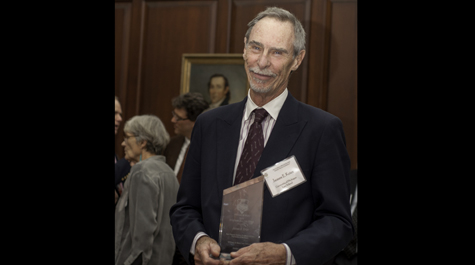U. Michigan's James E. Krier Honored with 2012 Brigham-Kanner Property Rights Prize
Award Ceremony and Launch of New Journal Among Highlights of Ninth Annual Brigham-Kanner Property Rights Conference
The William & Mary Law School Property Rights Project awarded the 2012 Brigham-Kanner Prize on Oct. 11 to Professor James E. Krier of the University of Michigan Law School at a dinner in his honor on the eve of the Project's ninth annual property rights conference. The conference on Oct. 12 drew many of the nation's leading scholars and practitioners to the Law School for a lively discussion of current property law issues and for the chance to celebrate Krier's significant contributions to the field. The Project's new journal also debuted during the event.
In her remarks at the dinner, Chancellor Professor of Law Lynda Butler, director of the Project, told the audience that the prize is awarded each year to a person "who has made significant contributions to our understanding of property. The prize is awarded to someone who has thought deeply about property, about its relationship to the human condition, and about the importance of property rights to our social, economic, and political systems."
Butler said that Krier was "without a doubt one of the most creative property scholars and teachers of our time." As evidence of the esteem he enjoys among his colleagues, she quoted three former prize recipients: one, she said, hailed Krier as a "trailblazer," introducing interdisciplinary perspectives into the teaching of property; another praised his work in establishing " a social-scientific paradigm for studying property issues;" a third called his approach to property "refreshing and sharp" and described him as "an outstanding 'instigator.'" Butler told the audience that she "especially liked that description of Jim - as an 'instigator.'"
Krier's ground-breaking scholarship has, she said, appeared in books, book chapters, and numerous articles in many of the nation's leading journals, and has "been a source of admiration and frustration for many scholars who have realized in developing their own ideas that he was there first."
Another first, said Butler, was Krier's legendary "Property" casebook (with J. Dukeminier et al.), now in its 7th edition. "No property casebook before it," she said, "had woven the social sciences into the teaching of property."
Krier joined an illustrious list of prior recipients that includes Professor Frank I. Michelman, Harvard Law School (2004), Professor Richard A. Epstein, University of Chicago Law School (2005), Professor James W. Ely, Jr., Vanderbilt Law School (2006), Professor Margaret Jane Radin, University of Michigan Law School (2007), Professor Robert C. Ellickson, Yale University (2008), Professor Richard E. Pipes, Harvard University (2009), Professor Carol Rose, University of Arizona (2010), and Supreme Court Justice Sandra Day O'Connor (2011).
In his remarks, Conference Co-Chair Joseph T. Waldo, a 1978 graduate of the Law School, and partner and president of Waldo & Lyle in Norfolk, Va., recalled the impetus for the conference, first held in 2004. He said that the annual gathering grew from the belief that a forum was needed in which members of the practicing bar and members of the academy could meet and exchange ideas. It is the members of the bar, he reminded the audience, who are "doing battle every day to try to shape the law and to try to protect the traditions of property rights that I think made America so great and that are a cornerstone of our democracy."
During the conference sessions on Friday, panelists discussed Krier's impact on the field, the judiciary's role in shaping constitutionally protected property, property rights in a time of economic crisis, and property's moral dimension. The meeting concluded with a roundtable that explored the fundamental nature of property rights.
For information about the 2013 conference, contact the William & Mary Property Rights Project via lsdevl@wm.edu or call (757)221-3796.



